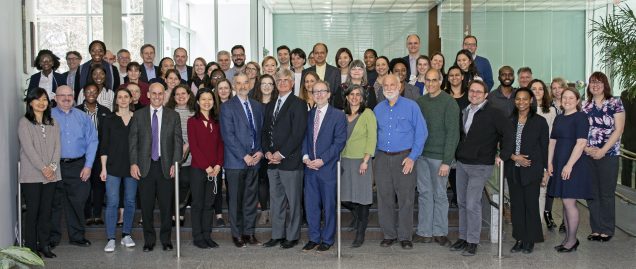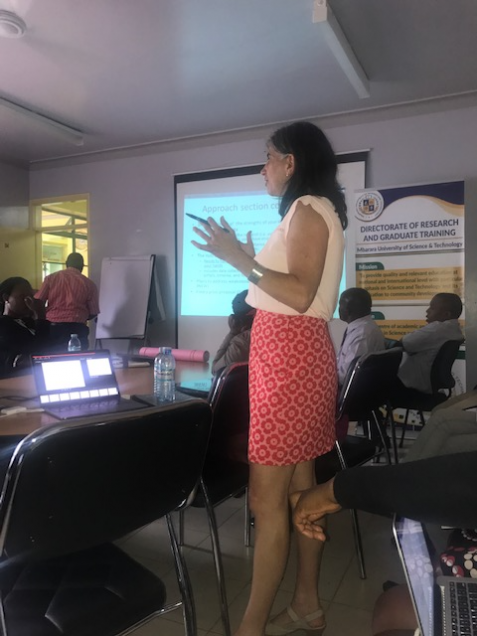Core and Cohort Updates
Admin Core

Thank you to all who attended this year’s URBAN ARCH Annual Meeting, which took place April 9–10 at Boston Medical Center/Boston University! The Admin Core has spent the past couple of months working on wrap-up tasks. We look forward to seeing you at next year’s meeting so stay tuned for more information!
The Admin Core has also been busy working with ARCH data and sample repository. Jules Canfield and Trevor Baker packaged and shipped two batches of Russia ARCH serum and plasma samples for biomarker testing for the TMAO and ACME studies. One batch was sent to the Cleveland Heart Lab and the other was sent to the University of Louisville.
Lastly, the Admin Core is looking forward to seeing collaborators at the Research Society on Alcoholism meeting in Minneapolis! URBAN ARCH will lead a symposium on Monday, June 24 titled, “HIV, alcohol and comorbidity: From the microbiome and immunity to clinical outcomes” with presentations from: Matthew Freiberg, Shirish Barve, Kaku So-Armah, Judith Hahn, Richard Saitz, and Kendall Bryant.

BDM Core
The BDM Core continues to assist each cohort with data management, the sample repository, conducting statistical analyses, and developing manuscripts. We are also very pleased to welcome Dr. Chanmin Kim to our core. Chanmin is an Assistant Professor of Biostatistics at the Boston University School of Public Health. His main research inters tests are in Bayesian methods, causal inference and mediation analyses. Chanmin is looking forward to collaborating on new analyses for Boston ARCH!
Uganda Cohort

The ADEPTT study is progressing well with a little over 2/3 of our total enrollment target of 300 participants met. As of June 1, 2019, we have enrolled 211 participants into the study, including 70 alcohol abstainers and 141 current alcohol drinkers, and a near equal number of males (106) and females (105). We have screened 1095 participants, of whom 929 were eligible for further screening for latent TB. Out of 895 PPD placements completed, 217 (24%) participants had positive results for latent TB and were eligible for the study. We’ve completed baseline procedures for all 211 participants enrolled, 199 two-week follow up study visits, 187 month-1 visits, 165 month-2 visits, 162 month-3 visits, 147 month-4 visits, 137 month-5 visits, 148 month-6 visits, 117 month-7 visits, 98 month-12 visits, 51 month-18 visits, and 2 month-24 visits. Fifteen participants have discontinued TB preventive therapy (INH) due to grade 3/4 level toxicities and two women have discontinued INH due to being pregnant. One participant is deceased and the cause of death was unrelated to the study.
The PI, Judith Hahn, visited the study field site in Mbarara Uganda to check in on study activities and meet with co-investigators and project staff. While in Uganda, Judy held a grant writing workshop with junior investigators at Mbarara University of Science and Technology.
Russia Cohort

As of June 1st, St PETER has enrolled 296 participants and an additional 21 participants have continued on in the Russia ARCH cohort without enrolling into St PETER. Three-month completion rate for St PETER is 79.7%.
The HIV Latency study (R61DA047032) began enrollment of St PETER and ARCH study participants at their final study visit on March 15th, 2019. This study will enroll participants from our ongoing Russia studies (St PETER, ARCH, LINC-II) and collect their samples to understand how opioid use affects the immune response in people living with HIV.
In March, Dr. Karsten Lunze and the SCRIPT study team successfully conducted a five-day intensive in-person workshop in Tbilisi, Georgia for his R00 study, “Stigma, Risk Behaviors and Health Care Among HIV-Infected Russian People Who Inject Drugs” (affiliated with URBAN ARCH). This workshop brought in experts from around the world to train the study team in a culturally adapted version of Acceptance and Commitment Therapy (ACT). The behavioral intervention uses metaphors and group exercises to increase psychological flexibility, target the emotions underlying internalized stigma relating to their substance use and HIV status, and thus empower affected people.

In April, members of the Russian study team traveled to Boston to attend the URBAN ARCH Annual Meeting, where we discussed study progress and future analyses.
The team is actively pursuing data analyses, abstract submissions, and manuscript preparation.
Accepted Abstracts:
- Pilot study of tolerability and safety of opioid receptor antagonists as novel therapies for pain among HIV-positive Russians with chronic pain and prior heavy drinking (Tsui, et al.)
- Late-breaking oral presentation at College on Problems of Drug Dependence (CPDD) in San Antonio, TX, June 18th, 2019.
Boston Cohort
As of June 5th, Boston ARCH 4F has completed 187 baseline visits (158 with participants from the original Boston ARCH Bone Cohort and 29 with participants new to the cohort), 136 6-Month follow-up phone interviews, and 42 12-Month follow-up in-person interviews.
The Boston ARCH team welcomed a new research assistant, Tiana Mason. Tiana graduated from Northeastern University with a bachelor’s degree in Behavioral Neuroscience, and is working toward her master’s in public health at Boston University. We’re excited to have her join the team!
Nicolas Bertholet, an associate physician at Lausanne University Hospital in Switzerland, and Samantha Rawlins-Pilgrim, an Internal Medicine resident physician at Boston Medical Center, presented Boston ARCH data at the 81st Annual College on Problems of Drug Dependence Scientific Meeting in June. Nicolas and Samantha gave presentations on “Polysubstance use patterns and HIV disease severity among those with substance use disorder: Latent Class Analysis” and “Substance use and quality of life in an urban cohort of people living with HIV and substance dependence,” respectively.
The team also contributed to a symposium led by URBAN ARCH at the 42nd Annual Research Society on Alcoholism (RSA) entitled “HIV, alcohol and comorbidity: From the microbiome and immunity to clinical outcomes.” The Boston team presented preliminary data from the current study: “Falls in people living with HIV infection and alcohol and other drug use.”